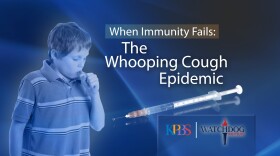There have been 298 pertussis cases reported in San Diego County this year, nearly six times the 53 reported this time last year, the county Health and Human Services Agency reported Tuesday.
There were 18 cases of the illness also known as whooping cough reported last week, according to the agency.
"Pertussis has shown no signs of slowing down and this high level of activity should be a concern for parents and caregivers,'' said Dr. Wilma Wooten, the county public health officer.
"The vaccine's effectiveness lessens over time so it's very important that adults get their booster shots and that they make sure their children have the necessary doses of the vaccine at the recommended ages.''
A typical case of pertussis starts with a cough and runny nose for one to two weeks, followed by weeks to months of rapid coughing fits that sometimes end with a whooping sound. Fever, if present, is usually mild.
Information about whooping cough and vaccination clinics is available at the HHSA Immunization Branch by calling (866) 358-2966, or online at sdiz.org.
Antibiotics can prevent spreading the disease to others and can lessen the severity of symptoms, according to health officials.
The U.S. Centers for Disease Control and Prevention recommends that children get doses of the vaccine at the following ages: 2 months, 4 months, 6 months, 15 to 18 months, and 4 to 6 years. Health officials also recommend that preteens and adults get a booster.
Infants younger than 1 year old are especially vulnerable because they do not have the full five-dose series of pertussis vaccinations.
Parents can obtain the vaccine series and the booster shot for themselves and their children through their primary care physician. Local retail pharmacies offer vaccinations for a fee, and anyone not covered by a medical insurance plan can get the shot from a County Public Health Center at minimal or no cost.







